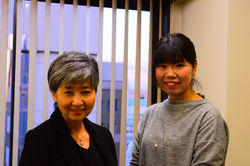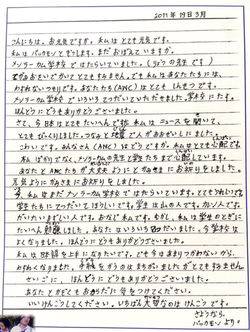ARTICLE
Interview with Asian Women & Children's Network
—“We were shocked to see the educational situation in the mountainous region in Chiang Mai.”
Q. We read that you established AWC after seeing the educational situation of the mountainous region in Thailand. Could you tell us more details about that?
A. There were many parents and children sitting on the streets, hoping to get a chance to enter school while some children were unable to get and crying because of the lack of foods and separation from their mothers. I compared the situation with Japan, where some students don’t even go to school just because they don’t want to, and came to think “This situation must not be ignored” and “I want to make school where children don’t need to cry due to the separation from their mothers.” Then, I established the office of AWC with my phone number and home address.
《The office was established only by 3 days when she was in Thailand. We, “Think” were surprised at the speed and her strong determinations!》
Q. Why did you start volunteer work?
A. I had been asked to support children in Thailand for a long time but I didn’t care so much. But those words directly came into my mind maybe because I felt relieved when my daughter passed the entrance examination of junior high school. At that point, I was so shocked to find I didn’t mind at all about any struggle of children in other countries. I can surely live without any attention to them, but I regarded ignoring those children was sad. That’s why I decide to start volunteer work.
—“It’s not about a process or plan. We do anything that is meaningful for children.”
Q. Please tell us about “Stop AIDS” and “Don’t sell children project”, the first two activities in Japan.
A. In 1997 (when the Asian Financial Crisis occurred), due to the shift to the floating exchange rate system of Thai Baht, the poor were subjected to bad influence. Many one-day labours lost their jobs, and human traffickers were growing in villages, so a social worker asked us to deal with the situation. We decided to support them with 200,000 Japanese yen, saved by fundraising and recycling activities in the previous year, and gave the teaching materials for people in villages. We made videos saying “Don’t sell children” in 7 different local languages and advertised like a TV commercial.
On the other hand, Japan is the country buying those people and own high level of printing technique which led huge production of children’s porno. Although UNICEF made a poster telling “kid prostitute is illegal”, we never saw it in Japan. Thus we called the Japan Committee for UNICEF and got the permission to put up the poster because UNICEF Japan was also desperate for it. In addition, we got a name list of the National Diet members and send letters “please discuss this matter immediately.”
《Mrs. Yamamoto looked back the time and said “We did anything that was meaningful to children (e.g. eliminating AIDS) as a group. Personally, I also felt that I want to grow up more as a human.” We are impressed by their strong will as a comment.》
—“ We have donated to many foundations, but you are the first one who donates all the money so purely.”
Q. How did the first school-building project start?
A. Our representative had an opportunity to talk with the president of NTT docomo (one of the top of Japanese phone company) and he told us “we can donate the funds to you. Visit us tomorrow as well !” We were so happy to have been able to build the new schools, and reported the construction progress with some photos. They were puzzled about our way, which seemed amateur, but I guess we could get their trusts in this way. When we submitted an estimated cost to join the completion ceremony without adding our flight fare, they said “We have donated for many foundations, but you are the first one who donates all the money so purely.”
Because this school-building project was carried out by properly making the most of the donation, we discussed and decided to build 10 more schools. They asked us to report our flight fare, but we kept participating in the completion ceremony three more times with our own budget.
《We really felt their honesty to work for children led to building a good relationship with NTT docomo and to getting new supports from them.》
In addition, since there was not enough number of desks and chairs, we began the donation as “Desk and Rice Project.” We sent thank-you letters to those who sent donation, with some pictures of the desks with their names on.
Q. Why don’t you introduce the membership system but raise contributions for each project?
A. If we introduce the membership system and collect the money for our activities as the membership fees, the donors cannot know exactly how the donated money will be used. Our representatives would like to make it clear and inform the donors about the result of the project.
Q. What troubles have you experienced since the organization was established?
A. When we sent the money for food to a school in a village of Myanmar, the government (it was a military dictatorship) suspected the teachers as a spy because they got donation from foreigners. And some staffs of the school were arrested by the army. After that, the village chief said, “The villagers are taken to somewhere when you came because of you. Never show up here again.
―With Warmth like a Family
Q. Do you think your PR activities, such as a lecture at a high school, have had an effect?
A. I always tell students to try to think about issues around them, take possible actions for them, and then act in practice because I believe some issues can be solved only by normal people like children or students. After the lecture, some students sent us a lot of spoiled postal cards (one postal card is worth 5 yen as a donation), and others sold our products at a charity event, and thus we could use its sales for new projects. Also, we accepted some students who wanted to work for AWC and gave a job, such as planning a lecture by an intellectual. One of the students contacted us because he wanted to work for a facility where the Arthur Pattaner Dek Foundation, one of our supporting organisations, helping street children and orphans whose parents died of AIDS/HIV. We allowed him to work for them and he stayed at the facility in the mountain of Thailand. We have still kept in touch with such motivated youths, and some of them are engaged in our activities even now.
《We consider AWC as such a “mother-like organization” because they widely open the door to everyone who is enthusiastic and interested in their activities. Now one member is working in Africa and another member have studied about human trafficking and now he is teaching at the university. In fact, I (the interviewer of Think) have taken her class twice before. I was really surprised at this coincidence! 》
Q. What do you expect volunteers like us?
A. I think it is difficult to continue doing volunteer work only for others. I like to see myself grow through the activities, so I can continue to work for such a long time even though I have faced many difficulties. To do volunteer work is surely for others, but I would like you to feel doing it for yourself as well. It seems that the harder experience I face, the better chance I can grow.
― “The Power of Mothers” Can Work as the Power of Japan
A woman, who entered a junior high school that AWC supported to build in 1998, sent a letter to the office in Japan. She got a scholarship and graduated from a university. After that, she wanted to help the people in her village and came back to the school. She said “Thanks to Japanese people, I was able to go to the school, and my life was greatly changed.” She has learned Japanese in high school and university, and now she is teaching it to children in the school. When the Great East Japan Earthquake occurred in 2011, she was concerned for the staff of AWC and sent the letter below.
(In this letter, she expressed her gratitude to AWC, concerned for them and told she was glad to work for the school as a Japanese teacher.)

We will deliver our interview article from Japan!
We interviewed Asian Women & Children’s Network (AWC) or so-called “mother-like organisation”, which is working on solving the violations of human rights for the people who were left in weak positions in the rapidly developing Asian society. AWC was established 20 years ago with the belief to make actions for these people as a mother as well as a citizen of Asia.
Today, we interviewed Mrs. Hiroko Yamamoto, who is the secretary general of AWC.


<After Interview>
Thank you for reading it to the end. It was my first interview to someone, and actually I didn’t know exactly how to do it, but Mrs. Yamamoto kindly accepted our request. I really appreciate it.
What I was impressed by is AWC’ s “enthusiasm” and “speed”. They have started to cope with a lot of issues speedily with an enthusiasm as Mrs. Yamamoto said “I can’t stand it without doing anything” and “I want to do whatever meaningful for children.” In addition, some of you may think that you don’t have enough pure and beautiful minds for volunteer work, but you don’t have to be afraid to take an action because “It will be a good thing to work for yourselves” as Mrs. Yamamoto said. Her words were sensational that she likes to feel she is doing something helpful to someone. She told us that it is important to work for ourselves in order to continue to contribute others through volunteer work. I hope this article will help someone who is afraid of taking a step forward.
I am really grateful to the kindness of AWC. We will continue to write articles. Please check a new article next time as well.
Asian Women & Children's Network HP (in Japanese) : http://www.awcnetwork.org/index.html
 |  |
|---|---|
 |  |
30th January, 2017
Sasaki
Sasayama, Miyagawa
